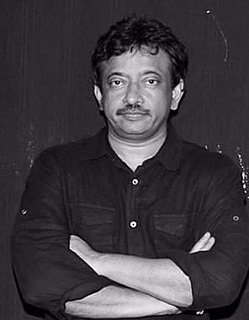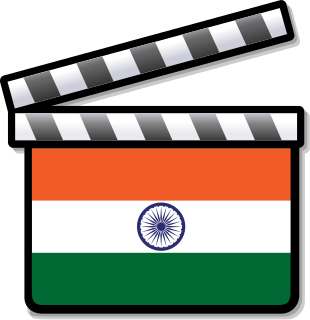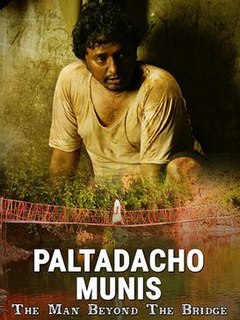Related Research Articles

Kasinadhuni Viswanath is an Indian film director, screenwriter and actor, known for his works primarily in Telugu cinema. He is recipient of five National Film Awards, seven state Nandi Awards, ten Filmfare Awards South, and a Filmfare Award in Hindi. He was honored with the "Prize of the Public" at the "Besançon Film Festival of France" in 1981. In 1992, he received the Andhra Pradesh state Raghupathi Venkaiah Award, and the civilian honor Padma Shri for his contribution to the field of arts. In 2017, he was conferred with the Dadasaheb Phalke Award, the highest award in Indian cinema.

Penmetsa Ram Gopal Varma, often referred to by his initials RGV, is an Indian film director, screenwriter and producer, known for his works in Telugu cinema in addition to Hindi, Kannada language films, and television. Varma directed films across multiple genres, including parallel cinema and docudrama noted for their gritty realism, technical finesse, and craft. Regarded as one of the pioneers of new age Indian cinema, In 2004, he was featured in the BBC World series Bollywood Bosses. In 2006, Grady Hendrix of Film Comment, published by the Film Society of Lincoln Center cited Varma as "Bombay’s Most Successful Maverick" for his works on experimental films.

Telugu cinema, also known as Tollywood, is the segment of Indian cinema dedicated to the production of motion pictures in the Telugu language, widely spoken in the states of Andhra Pradesh and Telangana. Telugu cinema is based in Film Nagar, Hyderabad, India. The nickname Tollywood is a portmanteau of the words Telugu and Hollywood. By 2021, it has emerged as the largest film industry in India in terms of box-office.

Nagulapati Srinivasa Chakravarthy, known professionally as J. D. Chakravarthy, is an Indian actor, screenwriter, director, producer, composer, and singer known for his work primarily with Telugu cinema in addition to Hindi, Tamil, Malayalam, and Kannada films. Chakravarthy made his screen debut with the Telugu film, Siva, an action blockbuster directed by Ram Gopal Varma, featured at the 12th IFFI. He subsequently made his Bollywood debut with the remake of the same film titled Shiva (1990). He then starred in the blockbuster Satya, featured in the Indian panorama section at the 29th IFFI, and was listed among CNN-IBN's 100 greatest Indian films of all time. Chakravarthy received the Screen Award Special Jury Award.

Maa Bhoomi is a 1979 Indian Telugu-language social problem film directed by Goutam Ghose in his debut. The film is produced by B. Narsing Rao, who also wrote the film with Goutam Ghose. The film is based on the novel Jab Khet Jage by Krishan Chander on the Telangana Rebellion in Hyderabad State. It depicts a typical life of villagers under feudalistic society in the Telangana region. The features Sai Chand, Rami Reddy and Telangana Shakuntala in pivotal roles. The plot follows Ramayya, a landless peasant who joins the Telangana Rebellion of 1948.

Paltadacho Munis or The Man Beyond the Bridge is an Indian film in Konkani directed by Laxmikant Shetgaonkar. Set in Goa, the film is about a recently widowed forest ranger in a dwindling forest, who strikes up an unlikely relationship with a woman he finds lost and alone in the woods. The film tries to destigmatise mental illness, often equated with being possessed by the devil in rural India.
Daasi is a 1988 Indian Telugu-language drama film written and directed by B. Narsing Rao starring Archana as Daasi Kamalakshi. The film won five honors including Best Feature Film in Telugu at the 36th National Film Awards, "For portraying the grim reality of a feaudal milieu through original and rare use of film language" as cited by the Jury, and the Diploma of Merit award at the 16th Moscow International Film Festival in 1989. The film was subsequently screened in the Indian Panorama at the 12th International Film Festival of India.

Bongu Narsing Rao is an Indian film director, screenwriter, littérateur, composer, poet, producer, actor and painter known for his works in Telugu cinema, and Telugu theatre. Rao has garnered five National Film Awards, three Nandi Awards, various international honors, and has served as a jury in various Asian film festivals. He directed, Daasi "(Bonded Woman)" and Matti Manushulu "(Mud People)" which won the Diploma of Merit awards at the 16th and 17th Moscow International Film Festivals in 1989 and 1991 respectively.

The International Film Festival of India (IFFI), founded in 1952, is one of the most significant film festivals in Asia. Held annually, currently in the state of Goa, on the western coast of the country, the festival aims at providing a common platform for the cinemas of the world to project the excellence of the film art; contributing to the understanding and appreciation of film cultures of different nations in the context of their social and cultural ethos, and promoting friendship and cooperation among people of the world. The festival is conducted jointly by the National Film Development Corporation of India and the state Government of Goa.
Matti Manushulu is a 1990 Indian Telugu-language drama film written and directed by B. Narsing Rao starring Archana. The film won the Best Feature Film in Telugu at the 38th National Film Awards, "For portraying the stark reality of pain which has been underlined with the warm hues of life" as cited by the Jury.
Maa Ooru is a 1987 Indian Telugu-language anthropological film written and directed by B. Narsing Rao. The film won the Best Ethnographic Film at the 36th National Film Awards "For recalling with nostalgia the life of a village community of the fifties in Telangana and does so with sensitivity and a graphic lyricism", as cited by the Jury.

Amshan Kumar is an Indian filmmaker and writer. He has won a National Film Award for his documentary film Yazhpanan Thedchanamoorthy - Music beyond boundaries in the year 2015. This is a lone Tamil non-fiction film to win a National Award in the past 17 years prior to this award He is also a writer on films, his book Cinema Rasanai on film appreciation is being used as a textbook in many universities. His debut feature film Oruththi was selected for the 2003 International Film Festival of India and was screened in the Indian Panorama section. His second feature film Manusangada was screened in the 39th Cairo International Film Festival and also in the 48th International Film Festival of India (2017) in the Indian Panorama section. He lives in Chennai.

Sanskrit Cinema is a part of Indian cinema. Only 15 films have been made in Sanskrit have been made so far since 1983. There is no separate industry set for Sanskrit films.
The 12th International Film Festival of India was held from 10-24 January 1989 in New Delhi. The festival was made non-competitive following a decision taken in August 1988 by the Ministry of Information and Broadcasting that festivals in future will be non-competitive and all festivals would be called International Film Festival of India (IFFI). The "Filmotsavs" and IFFI 90-91-92 together constituted 23 editions of the festival. From the 1990 edition, the IFFI was decided to be held for 10 days.
The 24th International Film Festival of India was held during 10-20 January 1993 at New Delhi. The festival was made interim non-competitive following a decision taken in August 1988 by the Ministry of Information and Broadcasting. The earlier "Filmotsavs" and IFFI 90-91-92 together constituted previous 23 editions of the festival.
The 25th International Film Festival of India was held during 10-20 January 1994 at Kolkata. The festival was made interim non-competitive following a decision taken in August 1988 by the Ministry of Information and Broadcasting.
The 26th International Film Festival of India was held during 10-20 January 1995 at Kolkata. The festival was made interim non-competitive following a decision taken in August 1988 by the Ministry of Information and Broadcasting.

The 52nd International Film Festival of India opened on 20 November 2021 with The King of All the World by Carlos Saura in Goa. Like 51st edition this edition was also held in hybrid format, that combined online and face-to-face participation. BRICS Film Festival is being held alongside main festival, in which films from BRICS nations, namely Brazil, Russia, South Africa, China and India are showcased. These five countries are 'country of focus' in the 52nd edition of the festival.
The 13th International Film Festival of India was held as IFFI' 90 during 10-20 January 1990 at the Empire Theatre in Kolkata. The festival was made interim non-competitive following a decision taken in August 1988 by the Ministry of Information and Broadcasting. The "Filmotsavs" and IFFI 90-91-92 together constituted 23 editions of the festival
The 14th International Film Festival of India was held as IFFI' 91 during 10-20 January 1991 at Chennai. The festival was made interim non-competitive following a decision taken in August 1988 by the Ministry of Information and Broadcasting. The "Filmotsavs" and IFFI 90-91-92 together constituted 23 editions of the festival
References
- ↑ "Archived copy" (PDF). Archived from the original (PDF) on 6 October 2014. Retrieved 22 September 2014.
{{cite web}}: CS1 maint: archived copy as title (link) - ↑ Chinnarayana, Pulagam (August 2007). శివ—సెల్యులాయిడ్ చరిత్రలో సహజావేశం [Siva—A natural frustration in the history of celluloid]. Telugu Naadi (in Telugu). United States. p. 54. ISSN 1559-7008. Archived from the original on 31 May 2016. Retrieved 9 April 2016.
- ↑ "International Film Festival of India 1990" (PDF). Directorate of Film Festivals. Archived from the original (PDF) on 20 April 2016. Retrieved 17 April 2016.
- ↑ "Directorate of Film Festival" (PDF). Archived from the original (PDF) on 2017-12-31. Retrieved 2018-01-11.
- ↑ "International Film Festival in India". rrtd.nic.in. Archived from the original on 21 November 2004. Retrieved 31 March 2020.